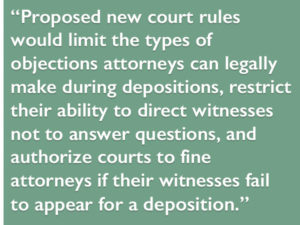The rules governing the manner in which depositions are conducted in Florida may soon be changing. Proposed new court rules would limit the types of objections attorneys can legally make during depositions, restrict their ability to direct witnesses not to answer questions, and authorize courts to fine attorneys if their witnesses fail to appear for depositions.
Significantly, the proposed new rule on depositions creates a presumption that violations of the deposition rule – including attorney incivility during the deposition – will result in the imposition of expenses, fees, or other sanctions against the offending attorney and his or her law firm.
Although Florida’s civil procedure reform process has been ongoing for nearly a decade, the effort picked up steam with the recent release of a working group report calling for extensive revisions to Florida’s rules of civil procedure. A major focus of the working group’s inquiry was pretrial discovery procedures. Deposition practice was singled out as an area ripe for legal reform.
The working group’s report should attract wide interest both within and outside Florida. Problems arising from civil case backlogs, abuse of discovery processes, inefficient motion practice, incivility, and the use of delay as a litigation strategy are not unique to that state’s courts.

The Florida Supreme Court requested publication of the working group’s proposals in the March 1 issue of Florida Bar News and set a comment deadline of March 31, 2022. The working group’s report noted that it had specifically charged to investigate the extent to which existing court rules sufficiently addressed and deterred (1) failures to prosecute cases, (2) discovery violations, (3) the assertion of unsupported claims or defenses, or (4) otherwise caused improper delays in litigation.
The working group studied four broad areas that could contribute to more effective case management:
- Improving case management practices by judges and court officers, such as early judicial intervention in civil cases, and the setting of pretrial deadlines and trial dates.
- Keeping cases on schedule by adhering to schedules for pretrial discovery and pretrial motions, limiting continuances, identifying failures to prosecute cases, and expediting small claims.
- Improving case reporting and judicial accountability as a means to encourage effective case management.
- Developing continuing education resources to educate the legal community regarding the need for improved case management.
In the area of depositions, the working group proposed a one-two-three punch: first, a new rule spelling out attorneys’ professionalism obligations; second, a new rule establishing norms for attorney behavior during depositions; and third, yet another new rule on sanctions that gives courts the authority to impose tough sanctions for attorney behavior that falls below Florida’s professionalism and civility standards.
The working group’s professionalism proposal, Rule 1.279: Standards of Conduct for Discovery, cautions against “surprise tactics, delay, trickery, and concealment of discoverable information” and reminds attorneys that “not meeting discovery obligations by delay, obstructing the truth, or failing to be candid with the court or opponents is discovery abuse over which the court has wide discretion.” Proposed Rule 1.279 also provides that Florida attorneys have a legal duty to conduct themselves in a manner consistent with their oath of admission to the Florida Bar, the Florida Bar Creed of Professionalism, the Florida Bar Professionalism Expectations, the Rules Regulating the Florida Bar, as well as the Florida Handbook on Civil Discovery Practice.
The proposed new rule on depositions, Rule 1.335: Standards for Conduct in Depositions, Objections, Claims of Privilege, Termination or Limit, Failure to Appear, and Sanctions, addresses several important areas of deposition practice:
- Conduct in Depositions. “Attorneys have a duty to conduct themselves consistent with the standards of behavior delineated in Rule 1.279.”
- Witness Conduct. Attorneys must advise clients and witnesses under their control to “act with honesty, fairness, respect, and courtesy.”
- Objections During Depositions. Legally permitted objections must be made during the deposition. “Any legally permitted objection during a deposition must be stated concisely and in a non-argumentative and non-suggestive manner.”
- Instruction Not to Answer. Limited to instances when necessary to preserve a privilege, to enforce a limitation on evidence directed by the court, or to present a motion to terminate or limit the deposition. “Otherwise, evidence objected to must be taken subject to the objections.”
- Failure to Attend or Serve Subpoena. A court may impose sanctions if a witness fails to appear for a deposition.
- Sanctions for Improper Conduct During Depositions. “Attorneys are officers of the court who are responsible to the judiciary for the propriety of their professional activities.” Prejudice is presumed if deposition rules are violated.
Finally, in this area, the working group proposed an additional new rule on sanctions (Rule 1.275) that spells out the sanctions judges are authorized to impose on attorneys found to have violated the deposition rules.
The docket entry for the Florida Supreme Court’s work on revising the civil procedure rules is In Re Report And Recommendations of the Workgroup on Improved Resolution of Civil Cases, No. SC22-122.